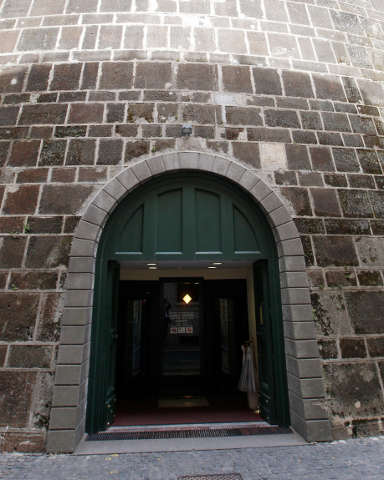
The main entrance of the Institute for the Works of Religion, known colloquially as the Vatican bank, is seen at the Vatican May 31. (CNS)
As Pope Francis dives into his curial reform, he has started with the Institute for the Works of Religion, a bank of sorts often acknowledged by church officialdom as a kind of distant and wayward relative of the Holy See.
And no wonder. Late last week, Italian authorities arrested a priest employee of the Vatican's administrative offices, Msgr. Nunzio Scarano, who is charged with conspiring to move 20 million euros in cash from Switzerland to Italy for his friends. Prior to his arrest, the priest had been under investigation in Salerno for money laundering, according to press reports.
The episode lent credence to long-circulated rumors that some of the Vatican bank's clerical accounts are used to stash cash for the underworld.
Pope Francis moved quickly to fumigate the Vatican bank. He appointed a trusted bishop to a top post, created a committee of bishops and advisers to report directly to him, and is moving quickly to introduce more transparency and accountability.
But that may not be enough to restore public trust.
The bank, which has operated since 1942 to further the work of papal and religious charities, has been the locus of scandal, intrigue and vendettas. Its coverage in the press serves as an unrelenting source of Italian entertainment.
Italy stopped allowing its banks to do business with the Holy See because of the Vatican bank's lack of financial transparency.
The pope emeritus, Benedict XVI, sought to install stronger financial safeguards to restore confidence in the operations of the Vatican bank. He created a centralized financial authority within the Vatican and issued new standards to meet the concerns of the European bank regulators. He also hired the bank's current president, Ernst von Freyberg, in one of the last acts of his papacy.
While Moneyval, a bank monitoring agency under the Council of Europe, praised these reforms, it has also maintained that the Vatican bank needed more serious improvement.
To the consternation of the public and to the continued embarrassment of Catholics worldwide, the Vatican bank remains a rich source of material for Italian journalists, conspiracy theorists and anyone else who wants to build a case for Vatican intrigue.
The question before Pope Francis is whether the elimination of the Vatican bank entirely -- which would mean giving up about $86 million euro in yearly profits -- would be the only sure way to be free of further financial scandal.
Vatican insiders will no doubt argue that the bank's continued operation can be justified because it turns a handsome profit and provides an income stream for the Holy See that has operated on the margins for decades. Others will continue to say the bank is able to move charitable funds to the global missions in a reliable and discrete way.
But such arguments are wearing thin in a post-9/11 world, where governments routinely scrutinize financial transactions no matter their source and where quality banking management is available right there in Italy. To the surprise of many, Italy has received high marks from the international community for its part in contributing to the safety and soundness of the whole international financial sector.
This is not to say that international banking is now known for its virtue. The manipulation of the Libor index, a daily reference rate based on the interest rates at which banks borrow, by some of the world's largest banks last year shows a breathtaking picture of cheating that has gone on within today's banking world. But that is quickly changing.
Within the United States itself, the Dodd-Frank Act and banking reforms enacted in the wake of the massive setback to the U.S. economy in 2007 have given government and the public more effective tools to scrutinize and assess the health of banking institutions. Operating in the dark is fast becoming impossible for banking everywhere. Reforms have brought far more daylight to this sector, and that is a precondition for rebuilding trust and restoring the global economy.
Despite the fact that the Vatican bank has new governance structures, in this writer's opinion, it will be remarkable if these are sufficient to restore public confidence in that institution, so impaired is it by its history of scandals.
At this point, the Vatican bank is a very damaged brand.
The reaction of Catholics in the pews to the closing of the bank, were that to happen, would be seen as more consistent with the bold measures of Pope Francis' new pontificate, which have aimed to simplify the courtly trappings of office and identify more closely with the poor of the world.
Over the long term, the closing of the Vatican bank will send a liberating message that the care of souls is the central focus of the church.
[Francis J. Butler recently retired after three decades serving as president of the nonprofit, philanthropic member association Foundations and Donors Interested in Catholic Activities, FADICA. He is the founder and principal of Drexel Philanthropic Advisors.]



